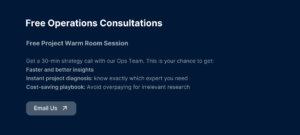
In an ever-changing world of consumer expectations, businesses and researchers are seeking more than just surface-level understanding; they want to know more about motivations, behaviors, and decisions made. That’s where in-depth interviews are incredibly useful. In-depth interviews are one of the best forms of qualitative data collection, providing data that is rich in detail and cannot be obtained through surveys or quantitative research.
In this blog, we review the significance of in-depth interviews, what makes them different from other methods, when to use them, and apply them to some examples from the field.
Importance of In-Depth Interviews in Research
- Gain Deeper Human Insights
Quantitative research tells you ‘what’ is happening, whereas in-depth interviewing tells you ‘why’ it is happening. In-depth interviewing lets the participant express the enabling emotions, beliefs, and motivations for behaviour.
- Explore Complex Topics
In-depth interviews provide participants with an opportunity to freely express themselves, discussing sensitive topics when the format is personal and confidential.
- Flexibility in Data Collection
Unlike rigid surveys, interviews allow surveyors to adapt questions in the moment, discuss broader topics, and gain more genuine responses.
- Ideal for New Product Development
Companies will use interviews to gain insights into customer needs, test new ideas, and gather more authentic responses.
- Valuable for Decision-Making
These insights provide actionable knowledge as part of a data-informed strategy in the areas of marketing, public policy, healthcare, social research, and innovation.
Advantages Over Other Qualitative Research Methods
While focus groups offer group dynamics and surveys capture numerical trends, in-depth interviews give unique personal perspective. The qualitative research method gives the participants freedom to share their thoughts without influence and enables authentic, descriptive data collection.
Key features of in-depth interviews:
- Open-ended inquiries
- One-on-one private setting
- Exploratory and flexible dynamic
- Focus on emotions, experience, and motivations
- Rich qualitative data collection
These features make in-depth interviews well-suited for understanding not only what people do, but the reasons why they do it.
In-Depth Interview Examples
Example 1: Healthcare Experience
A healthcare organization might interview patients to understand their emotional responses to the treatment they received. The response to these interviews will improve the quality and delivery of patient care protocols.
Example 2: Product Feedback
A technology organization may interview early users of a new mobile application to identify usability challenges or issues and preferences for features that surveys may not uncover.
Example 3: Social Research
Researchers talk to communities affected by climate change to understand how changes in the environment affect their ways of living, belief systems and mental health.
When to Use In-Depth Interviews
Knowing when to use in-depth interviews is essential for effective research planning. They are particularly beneficial when:
- You need exploratory insights at the early stage of a project.
- The topic is sensitive or confidential.
- You want to understand attitudes, perceptions, or emotional drivers.
- The target group is specialized or niche.
- You are developing personas or journey maps as part of market research.
Qualitative Data Collection Methods: Where Do In-Depth Interviews Fit?
In-depth interviews – along with focus groups, ethnography and case studies – are one of the most powerful qualitative research methods because they are personalized and are better able to reveal deep, narrative-based qualitative data.
Conclusion
In-depth interviews are one of the most effective techniques of qualitative research because of their unique ability to uncover deep motivations, emotions, and experiences. Whether you aim to develop a product, understand customer behavior, improve services, or assess social issues, in-depth interviews may provide you with clarity, direction, and actionable insights.
At Nexus Expert Research, we offer to design and conduct professional in-depth interviews to meet your needs and objectives, converting conversation into actionable data to help you succeed.









